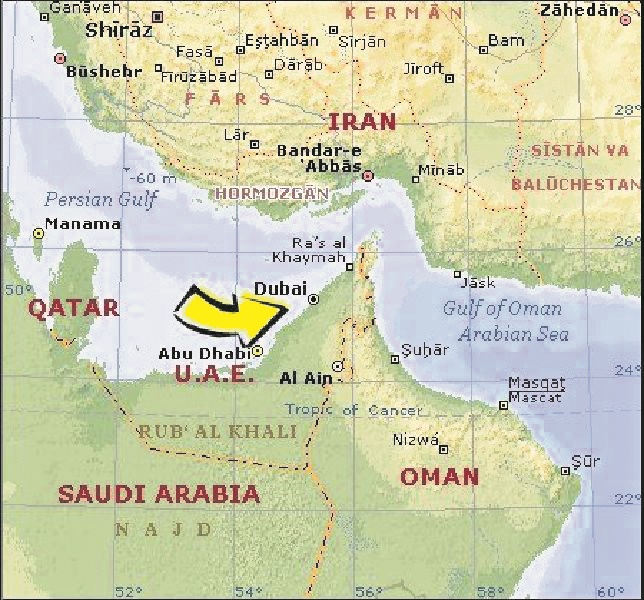Dubai – the Sheikhdom country is known for its high-income economy, high-end apartments and villas, great international schools and universities, luxury shopping options, yachting and beaches. Possessing excellent physical and social infrastructure, comparable to many developed nations, the property market of Dubai is an attractive investment destination for wealthy Indians.
The Ruler of Dubai Sheikh Mohammed bin Rashid Al Maktoum is also the permanent Prime Minister of United Arab Emirates (UAE).
Indian investors took full advantage of the real estate boom of 2004-2006 when the ruling regime in Dubai amended laws to allow foreign nationals to invest in property. A fully furnished 1bhk apartment in Dubai’s Sports City would cost anything between `45 lakh and `50 lakh. This is even cheaper than buying a house in metro cities of India. The market is also picking up due to the conflicts prevailing in other West Asian countries. Recent advertisements appearing in local newspapers and road shows in Odisha for real estate investments in Dubai attracted attention of the discerning.
The state of Indian visits to the destination is truly staggering. More than two million Indians visited Dubai in 2018 i.e. the highest number of international overnight visitors, according to a latest official data. Foreigners have always been vital for that nation’s real estate boom, and South Asian investors in particular have become the driving force behind the demand. About 35 per cent of the population of Dubai are Indians.
The bulk of remittances received by Indian families come from West Asian nations. One tenth of Kerala’s population or about 2.4 million people remit about `One lakh crore from the Gulf every year.
According to data compiled by Dubai Land Development, 1,387 Indian nationals invested United Arab Emirates Dirham (AED) 3 billion through 1,550 real estate transactions. From 2013 to 2017, Indians bought properties worth AED 83.65 billion in Dubai. A Dirham is equivalent to 18.67 Indian Rupees.
According to data from DTZ Research, most of the investors from India are from the film fraternity, business and other high net worth individuals (HNIs) who either look for a return on investments in the form of capital appreciation and lease rentals or who intend to show off their iconic address. Or have extra cash to stash away.
Dubai remains one of the safest havens to park unaccounted money. The bulk of transactions in the financial Bohemia are made by wealthy Pakistanis and Indians to escape domestic persecution and taxes. According to sources in Dubai, close to US$100 million moves from India to Dubai every single day!
This money uses an informal money transfer system, the ‘hawala’ route, where rupee gets converted to dollar at market exchange rates. This route is used to invest Indian black money in Dubai property. And since the city-nation charges no tax on rental income or any capital gains on purchased property, affluent Indians know that their investments are safe.
However, such operations have landed unscrupulous investors in a soup many a time. In 2018, around 7,500 Indians, who purchased posh properties in Dubai, came under the scanner of Income Tax (IT) department. Hawala networks are also linked inextricably with circulation of fake currency. This was proved in the 2013 arrest of Abid Chullikalavan Hassan at Kochi airport. He was in possession of a relatively small amount, Rs 9.5 lakh in counterfeit notes.
More importantly, he identified a Jeddah-based Indian national, Abdul Salam of Malappuram, as kingpin of the fake currency racket. Salam, who was arrested by the NIA at IGI airport in New Delhi, revealed that he had smuggled fake currency worth Rs 3,000 crore in a five-year period (2009-14) to Kerala.
Indian laws permit no more than $200,000 to be remitted under the liberalised remittance scheme per financial year. However, premium property costs more than that. Secondly, an Indian resident can acquire property outside India only by way of gift or inheritance from a person residing outside India, as per the Foreign Exchange Management Act. These legal hassles are often burdensome. This makes hawala the best option for illegal transactions.
In a recent letter to Union Civil Aviation Minister of State Hardeep Singh Puri, Odisha’s CM Naveen Patnaik impressed upon him the need of launching direct flights from the state to Dubai. Industrial investments and tourist footfalls were cited as the reasons for steady growth of traffic to and from the West Asian destination.
While business communities do have a case in this regard, there is hardly any significant inflow of tourists from Dubai to Odisha or vice versa. The UAE continues to be the preferred destination for migration of the affluent with tens of thousands of multi-million-dirham millionaires shifting their residence to the country in less than a couple of decades.
Partha Sarathi Sahu, OP
